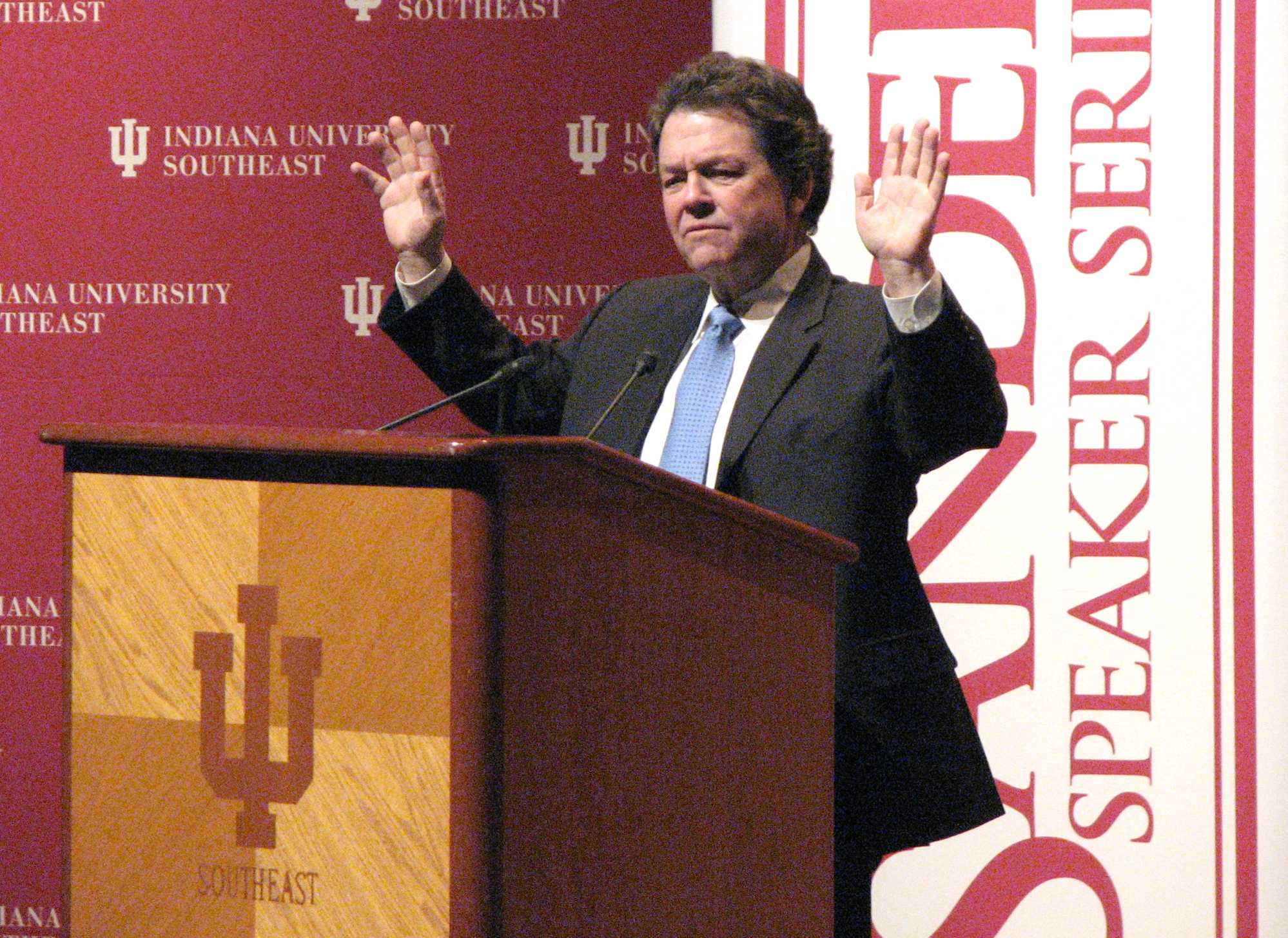
The Los Angeles Times said he was one of a dozen who shaped the ’80s, and, a decade later, Time Magazine called him one of the 20th century’s greatest minds.
Arthur Laffer, economist, came to IU Southeast on Feb. 23 to speak at this year’s Sanders Speaker Series to a crowd of about 350 people in the Ogle Center.
As a former member of President Ronald Reagan’s Economic Policy Advisory Board, his distinguished résumé spans throughout five decades.
Laffer talked about what he calls the most serious economic issue facing this country today — stimulus spending.
“I know of no one issue more important to the U.S. economy than the conflict that has occurred between those who support stimulus spending and those who truly oppose it,” Laffer said.
Stimulus spending has always been subject to debate, but Laffer said, for the first time, we have hit spending levels of about $3.5 trillion.
“Stimulus packages don’t work,” Laffer said. “Every president that I have ever heard of has wanted a free lunch. They just don’t get it.”
Laffer said why he thought stimulus spending doesn’t work.
Take the $600 stimulus check some Americans received from the government. The assumption is, with that $600, people will spend more than if they wouldn’t have received it.
He said this, in turn, will create jobs by those who are now supplying goods and services, causing them to spend more than they had before. This will cause a cascading effect on the economy.
“This is all very true,” Laffer said, “but it’s not the whole truth.”
While the stimulus does encourage spending, Laffer said it will de-stimulate the economy because the people who have given money toward the stimulus will now have less money to spend on goods and
services.
Laffer said this will separate people from the suppliers of these goods and services, causing them to spend less.
He said a stimulus will have a cascading effect in the exact opposite direction.
“You can never bail someone out of trouble without putting someone else into trouble,” Laffer said.
Laffer said good economics will work in a two-person economy.
A two-person society could be made up of farmer 1 and farmer 2. If farmer 2 is getting unemployment benefits, farmer 1 is paying for it.
Having opposed TARP and all stimulus-spending bills, Laffer offered his thoughts to an alternative solution.
“Imagine what the U.S. would look like today if, instead of stimulus spending, we eliminated all federal taxes for a year and a half,” Laffer said. “The unemployment rate would be at 3 percent, and we would be selling cars into central China.”
Laffer said, in order to have a prospering economy, America has to do five things — have a low-rate flat tax, spending restraints, sound money, free trade and minimal regulations that do serve a specific purpose.
Laffer said he wants people to understand economics, whether they agree or disagree with his economic views.
“I beg none of you to ever advocate your rights to make your own decisions about economics,” Laffer said. “I want you to understand economics so that you can make good judgments.”
Laffer’s understanding of economics comes from years of experience, and he has a long list of awards for his economic work to show for it.
He’s been a consultant to Secretary of Treasury William Simon and Secretary of Defense Donald Rumsfeld, as well as being the first to hold the title of chief economist at the Office of Management and Budget under George Shultz, economist.
To sum up his years under Reagan, Laffer told a story about his former boss.
“My colleagues and I used to tell Reagan that his one unique characteristic was his uncanny ability to select his four predecessors,” Laffer said. “Anyone who can follow on the heels of Johnson, Nixon, Ford and Carter just can’t look that bad.
“In all honesty, it did take Jimmy Carter to create Ronald Reagan,” Laffer said, “and, in that same breath, you won’t believe the president that is going to follow Barack Obama.”
By STEVE NICHOLS
Staff
stevnich@umail.iu.edu


